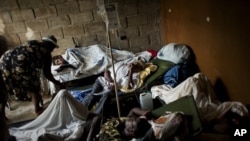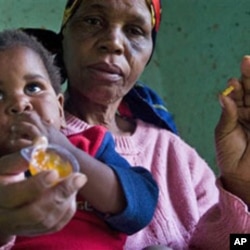A wide range of health stories dominated the news in the year 2010. From a cholera outbreak in Haiti, to a new, faster tuberculosis test, to a United Nations report showing progress against AIDS - good and bad health news dominated the media. Our reporter looks back at the health stories of 2010 and also takes a look at what the year ahead might hold.
Since last January's earthquake in Haiti, a cholera epidemic - resulting from contaminated drinking water - has claimed thousands of lives. Haiti had problems with clean water and sanitation even before the earthquake. Aid workers and health professionals worry the cholera infection might take years to defeat.
Dr. Jon Andrus is with the Pan American Health Organization. "The bacteria has a foothold in the river system and in other sources of water and it will remain, and it will be a challenge to control future spread," he said.
Waterborne illnesses also followed a natural disaster in Pakistan. Massive flooding in August and September brought the danger of infection on an unprecedented scale - with the nation ill-prepared to handle the feared epidemic on its own.
Dr. Anthony Fauci, Director of the U.S. National Institute of Allergy and Infectious Diseases [NIAID] outlined some of the possible dangers.
"You could get hepatitis, you could get e-coli, you could get salmonella, and you can get dysentery. So the possibilities of diarrheal-borne diseases are enormous when you have such a catastrophe of this magnitude," he said.
Battle continues
In a less spectacular manner, research continued in the battle against other serious, stubborn health problems.
A new study showed that cancer kills more than seven and a half million people a year worldwide - almost two-thirds of those in low-income and middle-income countries. The study said cancer kills more people in developing countries than AIDS, tuberculosis and malaria combined - but pointed out the world spends only five percent of its cancer resources in the developing countries.
Felicia Knaul, of the Harvard Medical School was one of the authors. "And we are seeing more and more how this is attacking young women. It's the number two cause of death in Mexico for women 30 to 44. All over the developing world, except the poorest-poorest, it's the number one cancer-related death among young women," said Knaul.
Scientists are working on vaccines to fight different forms of cancer. Researchers at Duke University say they have a new vaccine that can curb the growth of on aggressive form of brain cancer. One of the researchers is Dr. John Sampson.
"The most amazing thing that we have seen with this drug is we have a number of patients now who are surviving five years or more without any evidence of tumor recurrence," he said.
There is still no cure for yet another epidemic with soaring costs for patient care. Alzheimer's affects more than 35 million people throughout the world, and is the sixth leading cause of death in the United States. In a recent study, experts suggest early diagnosis of Alzheimer's is important for procedures and treatments to be effective.
"Governments worldwide need to be aware of the costs they're already incurring and how these are going to increase over time. They need to take action to make dementia a national priority in the same way they have done for chronic diseases like heart disease and cancer and stroke where proportionately the investment is much greater," said Professor Martin Prince of Kings College, London.
'Superbug'
Experts also continue to worry about the a so-called "superbug" with a mutated gene that has the ability to resist all known antibiotics. It has been detected in Australia, Canada, the U.S., the Netherlands and Sweden.
Professor Tim Walsh, of Cardiff University, says a coordinated effort is needed against it.
"What we need to do is to get authorities involved to set up a publicly funded antibiotics resistance global surveillance system, that's point number one," he said. "And secondly, we need to apply pressure on governments and also pharmaceutical industries to address this pressing need of having new antibiotics for NDM positive bacteria."
Good news
2010 did also bring some good health news. A United Nations report showed some hope for the global AIDs epidemic - pointing out that fewer people are getting infected with HIV and more are getting access to treatment.
Scientists also announced a groundbreaking study in which an anti-retroviral drug was shown to be effective in preventing HIV in gay men. Another study placed women in South Africa on a regimen using a topical vaginal gel permeated with an anti-HIV drug called Tenofovir. Dr. Fauci says this trial showed some positive results.
"The result was 39 percent efficacy, not overwhelming but still significant, and we hope to improve on that, particularly with better adherence to the regimen," he said.
Another groundbreaking innovation is a new test which can detect tuberculosis in less than two hours. Studies show the test is 98 percent accurate.
Experts say it will play an important role in diagnosing TB in both developed and developing nations. Dr. David Persing is with the California-based company (Cepheid) that makes the equipment.
"A key part of the technology is that it doesn't require a skilled operator to perform the test," he said.
New vaccines
New vaccines are also providing hope to contain both infectious and chronic diseases. A new polio vaccine holds promise in the fight against polio. Clinical trials in two countries have confirmed the effectiveness of the new vaccine. And the World Health Organization says complete eradication of polio could be in sight.
"The traditional polio vaccine is sometimes called the trivalent vaccine. It has three types type 1 - type 2 type 3. This one, the new one, has only two types with higher concentration of virus," said Dr. Peter Hotez, president of the Sabin Vaccine Institute.
And finally, those who are making New Year's resolutions for a healthy lifestyle this year should consider several new health tips.
Experts are now recommending higher doses of Vitamin D - to maintain strong bones, to protect against cancer and, heart disease, and to guard newborns against respiratory infections.
And a new study just out shows that one low dose of aspirin a day - about 80 milligrams - can significantly reduce the risk of death from some common forms of cancer.






